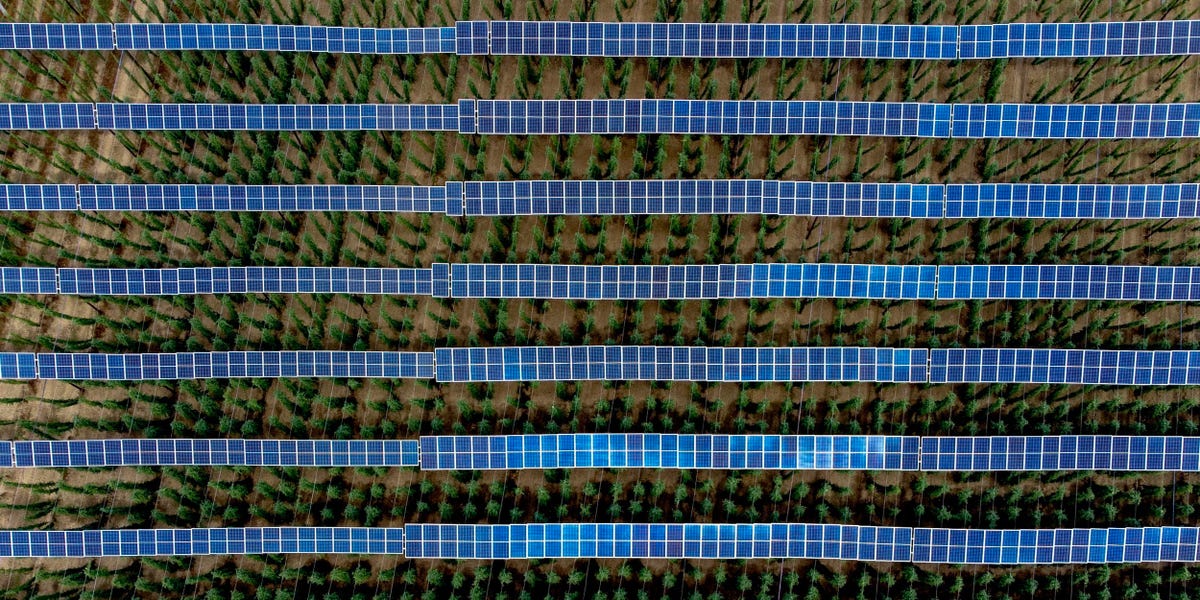I wonder if this could open the door to cost-effective desalination, carbon capture, and similar projects.
Maybe. The problem with these systems currently is that they also have large capital costs. So if you only run them during times when electricity is cheap, you end up having less production/revenue to offset those costs. So it doesn’t really pencil out yet, unless electricity becomes cheap all the time or you figure out how to build them really cheaply.
This is why the US is working so hard to stop renewables. Rich people don’t make any money when power is free.
Sure they do all they need to do is a bit a regulatory capture and free electricity for them means more profits while you continue to pay the same or higher prices.
Too much clean energy that is nearly free sounds like a much better type of problem to solve than most.
Oh no, it’s too bad Germany isn’t surrounded by other countries it could sell that excess power to!
It probably wouldn’t be negative prices if they could. I’m guessing it can’t be sold easily due to distance or some other factors? Which is why it maybe has to be used. But I’m just guessing.
The whole European grid is connected (which is a miraculous feat). And yes, there is a European market for energy where countries can sell surplus and buy in high demand situations.
The US is split into three power grids: Eastern interconnected, Western interconnected, and Texan (because Texas’ strident Independence forbid them from connecting to other states, even though their power grid has failed spectacularly in recent years). (I bring up these three delineations to show that energy can be transferred over pretty large distances.)
As we know, the US is a geographically large country. But technically, power can be transferred from the middle of Utah, across Nevada, and into California. So power transmission distances can be pretty large.
There is energy loss for sure, so it’s not always especially efficient. But if Germany is generating so much solar power that it’s impacting their market costs, that shouldn’t be a massive hurdle. In essence, they should be able to sell electricity to Poland or Austria or other neighboring countries.
Maybe there are other reasons that restrict Germany from selling their surplus power. But I don’t think distance is it.
The thing is, it is not a German-only topic. There is the same discussion ongoing in Austria. There is a lot of solar already in place. That is really great! Now we need good storage solutions as a next step
Interesting. Yes, this is a good problem to have.
Germany has lots of grid connections to other countries, and are pretty surely selling off what they can get rid of, but France has nuclear, Sweden and Norway have hydro, Denmark has wind and solar. All these markets are also currently negative. We’ve had negative prices for almost 14 days now, but somehow they went into plus today, although we (personally) had lots of sun and could sell 54 kWh from our solar panels.
Denmark has had negative prices for 14 days, and we are connected to the grids of Germany, Sweden, Norway and UK. Of course Germany has similar connections to even more countries.
I just checked, and the prices are near identical between: Germany, Belgium, Poland, Austria, France, Denmark, Norway, Sweden, Estonia, Latvia and Lithuania.
Oh no, it’s too bad Germany isn’t surrounded by other countries it could sell that excess power to!Your comment is based an a false assumption that they are not already doing that.
Wait. You know they were being sarcastic right?
I thought you really just wanted to show your knowledge until that last part.
Of course it was sarcastic, which is exactly why it doesn’t make any sense. The sarcasm is what’s idiotic about the comment I replied to. Because it indicates that Germany isn’t using obvious options. Of course they are using those options, as are all other European countries.
Edit:
I’ve changed the last part of my comment above to show that I responded to the original comment understanding it as sarcasm.
Gee, you mean some internet rando didn’t figure out a solution that no one in German energy could think of?
I think he was suggesting that it’s not actually a problem and this whole article was penned by someone with an agenda to paint renewables as bad.
Which is a totally reasonable assumption honestly.
I don’t know how EU grids interoperate so this could be irrelevant:
There is a fear, with this sort of thing, of falling into the innovators curse. By moving first/fastest (especially when it comes to infrastructure) you make all the mistakes, have the oldest equipment, and the most technical debt. Now if Germany is able to make a market (that didn’t previously exist) out of this excess daytime generation they could get undercut by a neighbor who learned from all of Germany’s mistakes and who bought newer, more efficient panels. Which would effectively take Germany’s costs associated with making the new market and set the money on fire.
Basically the fear of capitalism can be as detrimental as the capitalism.
Cheap energy being framed as some kind of problem is a great demonstration of why we need a free press that isn’t solely owned by billionaires
Well it is a problem, sort of. It’s a failing of the market.
But it does open up another market for energy storage so it will save itself through regular marker forces.
But we absolutely want energy suppliers to make money off solar (over a year) or they will simply stop building more of it. I’m not sure if the German state is losing money on this though, in which case they absolutely need to build more storage.
I’m getting really worried about how energy is going to be generated in winter once solar and batteries completely dominate energy production in the summer.
But it does open up another market for energy storage so it will save itself through regular marker forces.
This is the market working properly.
Well yes.
But having to pay people to take a good/service from you is really/ really weird. Not really sure how to describe it.
Happens all the time. My employer pays a company to come collect our e-waste, which they then sell to a recycler who strips it and sells the recycled metals. One company’s trash is often another one’s treasure. Or better yet, one company’s liability is another company’s asset. Excess electricity is a liability to the electric company so they pay to get rid of it. The amount they’re paying for disposal is less than the potential cost of keeping the liability around (equipment failure in this case).
The thing is that it does represent some problems. First of all if Germany has already reached the limit of what it can do with solar then that’s sobering news because it is far from 100% sustainable. More solar than it can use? We should ask why. Not enough storage capacity: that’s a problem when consumers use more power in solar off-hours. And if energy prices become too volatile or even negative, that could harm the non-solar energy provider who provide the backup that solar requires.
I get the anti-corporatist message and all, but really we should look a little more deeply than our favorite narrative if we want to understand things. Reddit also needs to realize that business pages cater to business interests and investors, so not every headline is framed in terms of consumer benefit. News outlets can publish articles for business readers whether or not they are owned and puppeted by them.
Reddit?
it an old site like, kinda like Digg. all the brains left about a year or so ago when they made some horrible business choices and then IPO’d. a lot of the users came here to lemmy.
The problem isn’t that the energy is too cheap, it’s that there’s too much of it, which is why it’s so cheap. An electrical grid can only support so much power and there is no cost effective way to store enough energy to run the grid for any appreciable amount of time, so it all must be used or else the system becomes unstable.
That’s so. At the same time I’m seeing heaps of stories about me ways to cheaply store power with cheap and common materials lately, so it seems like more of an engineering and infrastructure problem
I can hear Nikola Tesla rolling over in his grave
Hook those coffins up to generators for infinite free electricity.
Make it output only DC and watch it churn!
Can we use him to generate power?
They could always just close their coal power plants. Idk why they don’t.
because solar panels are not a controllable energy source, solar is great until there’s a cloud or it’s nighttime, coal on the other hand is a controllable energy source. Since we can’t effectively store energy we have to be constantly producing enough for the whole population, it’s a really hard job!
Because they would have brownouts overnight and when the weather was bad.
Obviously…
My guess is that in a climate like Germany’s, solar isn’t consistent enough to provide the steady baseline power that coal plants can.
One of the complexities of power infrastructure is that demand must be met instantaneously and exactly. Coal and solar typically occupy different roles in a grid’s power sources. Coal plants are slow to start, but very consistent, so they provide baseline power. Solar is virtually instantaneous, but inconsistent, so it’s better suited to handle the daily fluctuations.
So, in a place like Germany, even in abundance, solar can’t realistically replace coal until we have a good way of storing power to act as a buffer. Of course, nuclear is a fantastic replacement for coal, but we all know how Germany’s politicians feel about it…
We also know building nuclear takes 20 years and costs more than building thrice the capacity in renewables + Germany has no long-term nuclear storage, only temporary one’s a la Simpsons.
Germany had 17 active nuclear plants in 2011 and decommissioned them all by 2023.
They were already past their expiry date. Germany would face the same shit France is facing with their old reactors.
You are correct that when you build one new plant every 25 years it takes a long time to spool the industry, the skills, the testing and the manufacturing capability up to build new nuclear.
In countries that regularly build new nuclear it takes 5 years, comparable to any other power source. When France when through their mass-conversion to nuclear in the 70s (following the oil crisis), they put 2-3 new nuclear plants into operation every year.
All new western nuclear is in “production hell”. We don’t build them often enough to retain the skill set or for industry to dare invest. So they become massive state-run enterprises.
If we were serious on solving our climate crisis we would build nuclear power plans en masse.
We also know building nuclear takes 20 years and costs more than building thrice the capacity in renewables
Nonsense, https://nanonuclearenergy.com/, https://www.nuscalepower.com/, http://smart-nuclear.com/, etc.
I guess I meant not all of them and especially not at the same time but that wasn’t clear in my first post. I understand that a baseline is needed but if during daytime they’re generating excess constantly then shutting down a few wouldn’t hurt. Especially since Germany is one of the biggest offenders in the world when it comes to coal. Storage is definitely a concern but in case of surges there’s other power from neighboring countries that can help with the demand. Sodium ion batteries are looking like a good possibility.
Coulnd’t we use solar to pump water into reservoirs, and then let the water flow through hydroelectrical dams when we need the electricity?
[yes](> https://en.wikipedia.org/wiki/Pumped-storage_hydroelectricity)
Taking into account conversion losses and evaporation losses from the exposed water surface, energy recovery of 70–80% or more can be achieved. This technique is currently the most cost-effective means of storing large amounts of electrical energy, but capital costs and the necessity of appropriate geography are critical decision factors in selecting pumped-storage plant sites.
Oh wow, I had no idea this existed. Awesome!
Wait Are these not common where you are?
Germany it’s more the Russian gas they get. Shit hit the fan for them when they invaded Ukraine. Germany was like fuuuuuuuu
Not enough preparation for saving energy overnight.
Because as the article says, consumers use more power during non-solar hours.
The Ukraine war has also caused oil and gas prices to rise in Europe, so all alternatives to those need to remain on the table until Russia fucks off.
Not to be too much of a contrarian, but it sorta is a problem if it is too cheap to support the people that are required to repair it and the parts/replacements for stuff that has failed. Plus, in 20-30 years you are going to have to have enough money on hand to replace todays panels, which if energy costs are almost free/negative, you might not. These are somewhat solvable problems (make energy costs just a tax to support the grid and cut out profit from the equation for the public good), but it is a bit of an issue that probably needs to be planned for.
Then it’s not “too cheap”. Charge the price it takes to maintain the production.
Leave it to the business world to wet-blanket this because of money. Really helps the cause, public opinion, and such.
Nice. Now work on storage solutions to cover nights.
It’s pretty funny. The article says that this is where money is being spent next (it implies it’s government funded), but the author acts like that’s a bad thing.
Unless new installations are spurred on by subsidies or power purchase agreements, oppressed profitability could eventually halt Germany’s solar expansion, Schieldrop said.
Instead, focus is likely to move onto improvements that will make more use of the energy produced, such as investments in batteries and grid infrastructure.
It’s wild. This guy is suggesting that they subsidize solar installation, in the exact same article where he’s saying there’s too much solar. Either the article is disingenuous or he’s an absolute idiot.
Solar production is quite variable. This time of year there is often excess production, but in fall or winter there can still be shortages. So it may still be worth subsidizing more production, though there might be a debate as to how much subsidy should go to storage vs extra solar production. Another possibility is to come up with non-capital intensive ways to turn cheap electricity into something useful but I’m not totally sure what that would be.
“oppressed profitability” is a fucking brutal turn of phrase.
No, it’s not wild or pretty funny. The author says that if energy prices are negative then there’s no incentive to build up more generation capacity and more incentive for storage capacity. If the government still wants more generation capacity then it has to provide incentives i.e. subsidies.
Wow, two of them.
Either the article is disingenuous or he’s an absolute idiot.
Or maybe you didn’t realize this was an analysis of the situation and an outlook on possible future development based on his economic expertise rather than a call to action.
They’re not mutually exclusive.
sounds like a good problem to have
This is a clear social good.
If it threatens economic hardship on solar power producers then it’d be extremely rational for the government to subsidize those companies.
It’s just a question of shifting load. As electric cars become more common you could program the residential and parking charges to only charge when electricity is free and stuff like that.
If the problem is that energy is too cheap, then the power grid should be entirely nationalized. We don’t need to prop up their profits.
I’m all for nationalization[1] but Germany hasn’t indicated that’s a direction they’d like to go in - it’d be absolutely terrible if this clear good ended up collapsing the green energy market and forcing a nove back to fossil fuels though.
- Actually, specifically in Germany’s case, I’m not in favor of nationalization since something is seriously fucked up w.r.t. their energy policy. I don’t trust the people who just shuttered all the nuclear reactors.
Capitalism simply cannot comprehend not paying for things.
More from the same author:
Starvation and malnutrition plummet as crop yields increase. Unfortunately a new industry of storing food must be created to ensure the excess is preserved for times of need.
Free time skyrockets as menial labor is offloaded onto AI and machines. Unfortunately a new self-actualization industry must be created for people to learn intellectual and creative skills they didn’t have time or money for.
Higher education rates increase as governments help fund students and enact laws to keep for-profit-education from price gouging. Unfortunately untold new industries are created as unnoticed talent is given the opportunity to cultivate it.
In reality, this doesn’t mean that consumers are reimbursed to use electricity, as they’re not paying raw market price.
So this is literally just pure profit for the producers, and they’re still complaining
No it’s not, it’s a clear loss situation for producers. The companies that sell to end users may make a bit extra, but even when they have fixed price agreements, this is calculated in to some degree.
Here (Denmark) we have variable price agreements by the hour, and most companies stopped offering fixed prices at all, after the price hikes when Russia invaded Ukraine. That was a situation where many electricity traders (middlemen) made huge profits, and the bill was handed down to consumers. Some companies expected prices to increase more than they did, so the fixed price agreements were awfully expensive, Often more than double what they should have been. They were also generally payed in advance, which caused huge bills even if you cut consumption hard.
The electricity market is an awful market, because it’s treated as if it’s a free and open market, but in reality it isn’t, because it’s tied to a lot of infra structure, and it’s also tied to a lot of long term agreements, because that’s the only way to plan infra structure properly.
This was expected. When solar panels were expensive, you had to optimize for output. When you get the same rate for any kWh, you optimize for output. Now that PV is cheap as fuck, of course, there’s going to overproduction.
Now the dynamic will change. Instead of facing south, it becomes attractive to orient east/west. This generates more output on mornings or evenings. As a next step, you add batteries to the mix. Yes, they said they were expensive, need rare materials, and yadda yadda; except with lower prices every month, solar batteries are thing now.
Also “overproduction” is relative. Most of our heating and transport is fossil. There’s a long way to go.
To capitalists, a world without private profit, winners with too much, and losers with nothing isn’t a world worth existing.
Always interesting https://www.energy-charts.info/charts/price_spot_market/chart.htm?l=en&c=DE



















